How to Overcome Interview Anxiety: Top Tips to Succeed
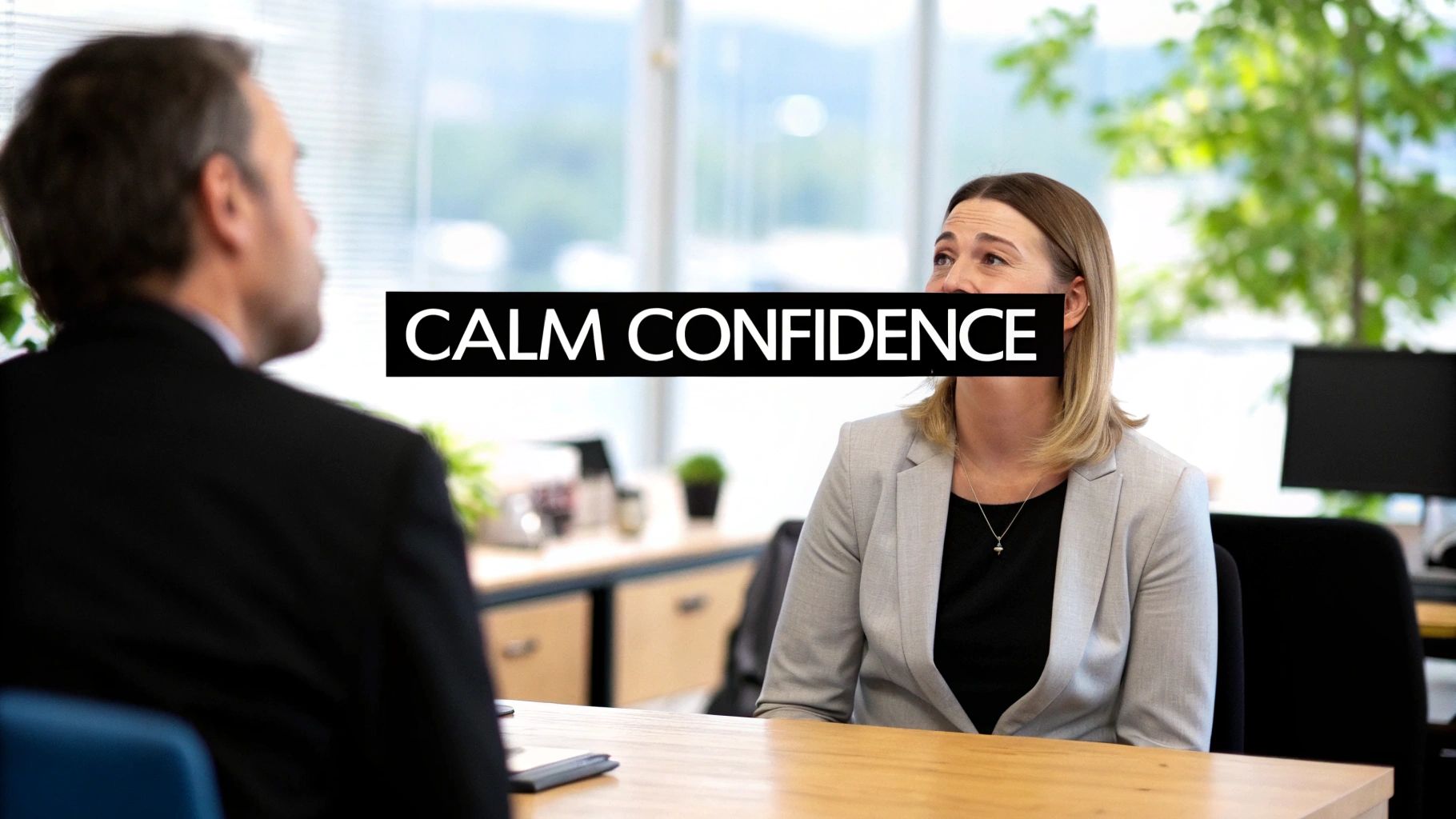
Before we can tackle interview anxiety, we have to understand where it comes from and have a solid game plan. The key is to shift your mindset, learn a few practical calming tricks, and build up your confidence with smart preparation.
Why You Feel Anxious Before an Interview
That feeling of your heart hammering against your ribs right before an interview isn't a sign you're not cut out for the job. It’s an incredibly human response to a high-stakes moment. Let's be honest, job interviews put you under a microscope, and that can stir up fears that nearly everyone has felt.
Most of this anxiety is a cocktail of psychological pressures. We worry about being judged, feel the immense pressure to say everything perfectly, and get stressed by the complete uncertainty of it all. You're probably replaying scenarios in your head—what if you blank on a simple question? What if you just don't click with the interviewer?
The Science Behind the Nerves
When your brain senses a "threat"—and a high-stakes interview definitely qualifies—it kicks your "fight-or-flight" response into high gear. This is your amygdala going to work, flooding your body with adrenaline and cortisol. That's what causes the physical stuff: the racing pulse, the shaky hands, the feeling that you can't get a full breath. It’s an ancient survival instinct, just applied to a modern-day challenge.
And if you think you're alone in this, think again. Research shows a massive 93% of job candidates get nervous before an interview. In the UK, the fear of public speaking, which is a huge part of any interview, is the top workplace fear for 32% of people. You can find more workplace anxiety statistics that show just how universal this feeling really is.
Acknowledging Your Triggers
The first real step toward managing this anxiety is to name it. Just telling yourself to "calm down" almost never works. Instead, you need to get specific and figure out what’s actually setting you off.
Think about what truly worries you:
- Fear of the Unknown: Are you dreading a curveball question or sitting across from a stone-faced interviewer?
- Performance Pressure: Does it feel like this single conversation will make or break your entire career?
- Social Evaluation: Is the anxiety really about what they'll think of you as a person, not just your skills?
- Past Experiences: Is a bad interview from years ago still haunting you and making you second-guess yourself?
Pinpointing the source of your anxiety changes everything. You stop battling a vague, overwhelming sense of dread and start tackling a specific, solvable problem. That small shift gives you back a sense of control.
Once you realize that these feelings are completely normal and have predictable psychological roots, the anxiety loses some of its power. It’s not a personal weakness; it's just a shared human challenge. This new perspective lets you stop fighting the nerves and start using that energy to prepare more effectively.
Building Your Mental Game Plan Before the Big Day
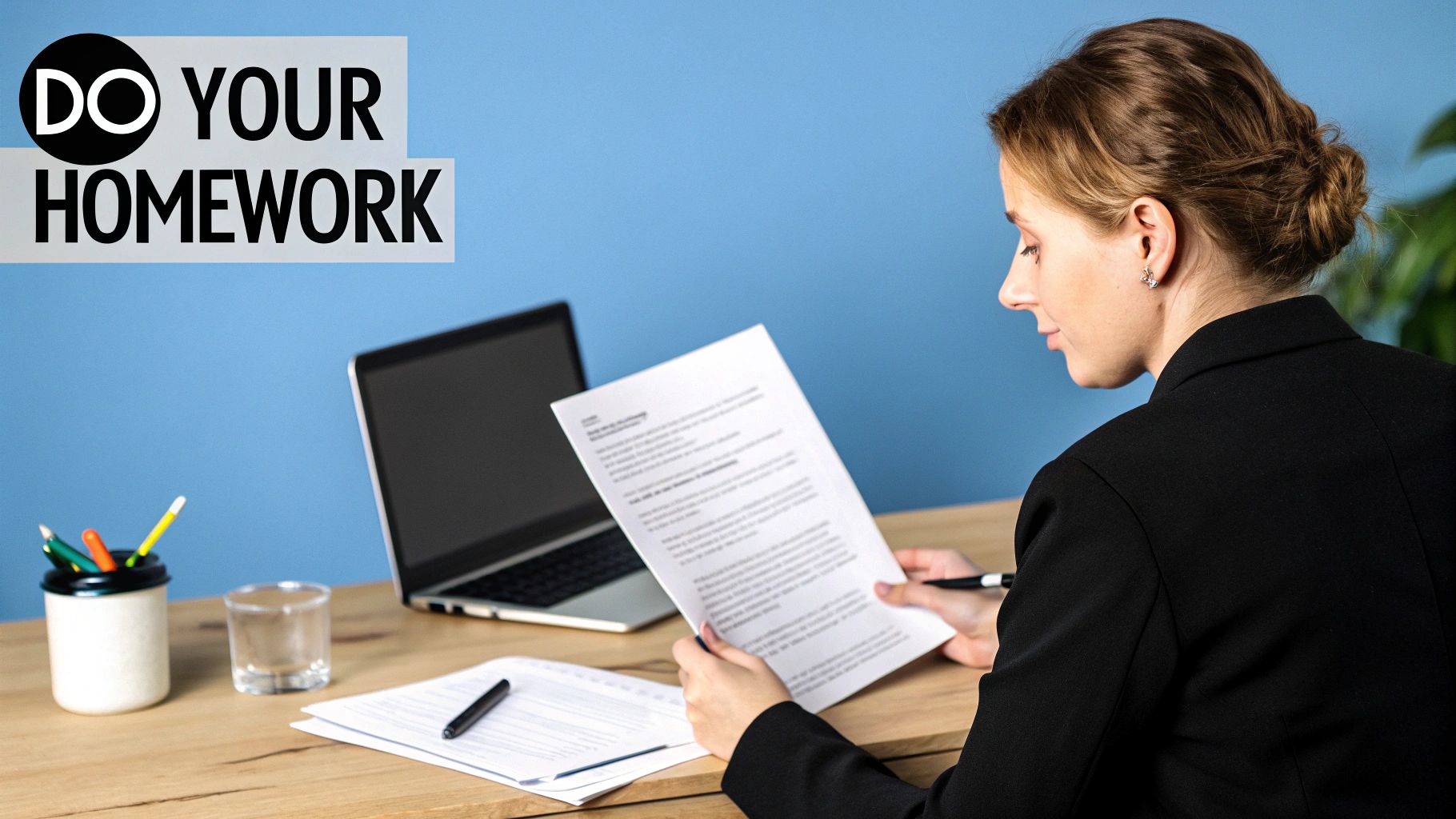
Real confidence isn't a switch you can just flip on moments before an interview. It's something you build, piece by piece, in the days leading up to it. This is your chance to actively shape your mindset and walk in feeling prepared, not panicked. We're going to move beyond simple "think positive" advice and get into practical mental techniques that actually work.
The whole point is to reframe the interview in your mind. Stop seeing it as a scary interrogation and start seeing it for what it is: a professional conversation. It’s a two-way street where you get to show off your skills and, just as importantly, see if the company is a good fit for you.
Catch and Reframe Negative Thoughts
Let's be honest, that little voice in your head—the inner critic—can get really loud before an interview. It loves to throw a bunch of worst-case scenarios at you. The trick isn't to pretend you don't hear it, but to catch those thoughts and challenge them head-on.
When a negative thought pops up, don't just let it run wild. Pause and really look at it. For example, if you find yourself thinking, "What if they ask me something I can't answer and I just freeze?"—that's your cue to step in and reframe it.
Here’s how that looks in practice:
- Negative Thought: "I'm going to totally blank on my biggest accomplishments."
- Reframed Thought: "I know my work. I've already jotted down my key talking points, and I can glance at them if I need a reminder. It's about having a conversation, not a memory test."
- Negative Thought: "They'll probably think I'm not qualified enough for this role."
- Reframed Thought: "My resume was strong enough to get me this interview, which means they already see something they like. My job is just to connect the dots and show them how my experience solves their problems."
Every time you do this, you're training your brain to stop spiraling into self-doubt. You're replacing anxiety with a dose of realistic confidence.
Use Visualization for a Mental Rehearsal
Top athletes do this all the time before a big game, and it works just as well for job interviews. Visualization is basically a mental dress rehearsal. When you vividly imagine a successful interview, you're creating a positive roadmap for your brain to follow.
Find a quiet spot for about 10-15 minutes, close your eyes, and just play the movie in your head. Picture the entire interview going smoothly from start to finish.
See yourself walking into the room (or joining the video call) looking calm and collected. Imagine giving a firm handshake, making great eye contact, and offering a genuine smile. Hear your own voice answering questions clearly and confidently, sharing specific stories that highlight your skills.
This isn't just daydreaming; it’s a powerful form of preparation. By running through a successful scenario, you make the real event feel familiar and less intimidating. You're removing the fear of the unknown, which gives you a powerful sense of control when it's time to actually perform.
How Practical Preparation Builds Real Confidence
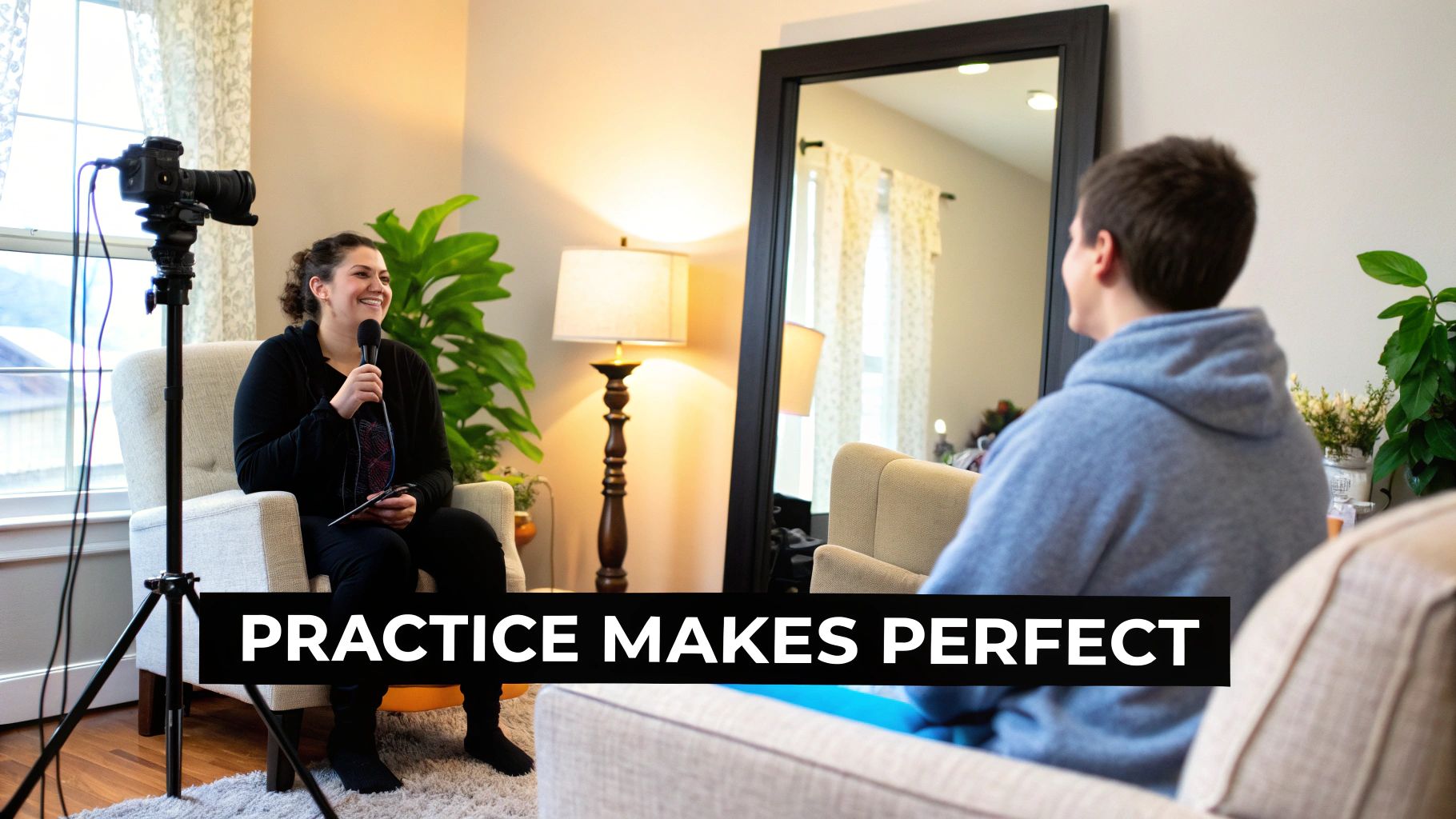
While mindset shifts are a huge part of the puzzle, nothing builds unshakable confidence quite like rolling up your sleeves and doing the homework. When you're genuinely prepared, there's just not as much room for anxiety to take hold. Knowing your stuff is the best defense against the fear of being caught off guard.
This preparation changes the entire dynamic. The interview shifts from being a scary interrogation into a professional conversation. Every bit of research you do and every answer you practice adds another layer of self-assurance. You start to feel less like someone under a microscope and more like a capable peer.
Go Beyond the Company Homepage
Real preparation is about more than a quick scan of the "About Us" page. You need to dig in and truly understand the company’s world—their recent wins, their current headaches, and what makes them tick. A surface-level glance just won’t cut it.
Instead of just browsing, get specific with your research. Try to find answers to these questions:
- What are their latest big wins? Hunt through their press releases, LinkedIn feed, or industry news. Finding a recent product launch, a major award, or a new client lets you bring up something specific and timely, which immediately shows you're paying attention.
- Who are their main competitors? Understanding their competition helps you position your skills as a solution to help them pull ahead in the market. It’s a subtle but powerful way to frame your value.
- What’s the culture actually like? Check out employee reviews on sites like Glassdoor, but read them with a critical eye. To get a better feel, watch interviews with their leaders or find employee spotlights on their blog. This helps you get a sense of their authentic voice.
Doing this kind of deep dive gives you the ammo to ask smarter questions and connect your experience directly to their needs. It proves you're not just looking for a job; you’re interested in this job.
Master Your Stories with the STAR Method
Those "Tell me about a time when…" questions can be terrifying. They're often where people get flustered and start rambling. The STAR method is the perfect tool to keep you on track, helping you deliver a clear, compelling story every single time.
Here’s how it breaks down:
- Situation: Briefly set the stage. What was the context?
- Task: What was your specific goal or responsibility in that situation?
- Action: This is the heart of your answer. What exact steps did you take to handle it?
- Result: What was the outcome? Use numbers here whenever you can. Think "improved efficiency by 15%" or "cut customer complaints by 25%."
My Advice: Prepare a few of these STAR stories ahead of time for common interview themes—think teamwork, problem-solving, leadership, and handling failure. They act as a safety net, so you're not desperately searching your brain for an example under pressure.
Walking into an interview knowing you have these solid, well-structured stories ready to go is a massive confidence booster. It gives you a sense of control when the stakes feel high. And they are high—remember, only about 2% of applicants even get to the interview stage. It's no wonder that 41% of candidates say their biggest fear is fumbling a tough question. Using the STAR method is your direct strategy for overcoming that fear. You can discover more about these job interview statistics and what they mean for your approach.
Proven Techniques to Stay Calm on Interview Day
You’ve done all the prep work, but when interview day arrives, a fresh wave of nerves can hit you like a ton of bricks. It’s completely normal. Now is the time to pull out a few simple, powerful techniques to manage that anxiety right in the moment.
These aren't complex psychological exercises; they are practical strategies designed to calm your mind and body just before you walk through the door or log into that video call.
One of the most effective tools you have is your own breath. When we get anxious, our breathing gets shallow and fast, which just tells our brain to panic even more. By consciously taking control and slowing your breathing down, you can physically short-circuit that stress response.
Master Your Physiology Instantly
I always recommend a simple but incredibly effective method called box breathing. It’s a go-to for people in high-stakes professions—think Navy SEALs and surgeons—who need to stay laser-focused under immense pressure. All you need is a quiet moment.
You can do this in your car, the waiting room, or even at your desk a few minutes before the interview starts.
- Inhale slowly to a count of four.
- Hold your breath gently for another count of four.
- Exhale slowly through your mouth for a full count of four.
- Hold your breath again for a final count of four.
Just run through this cycle three to five times. You'll literally feel your heart rate start to drop. This simple rhythm forces you to slow down and pulls your focus back to the present, away from all those "what if" scenarios running through your mind.
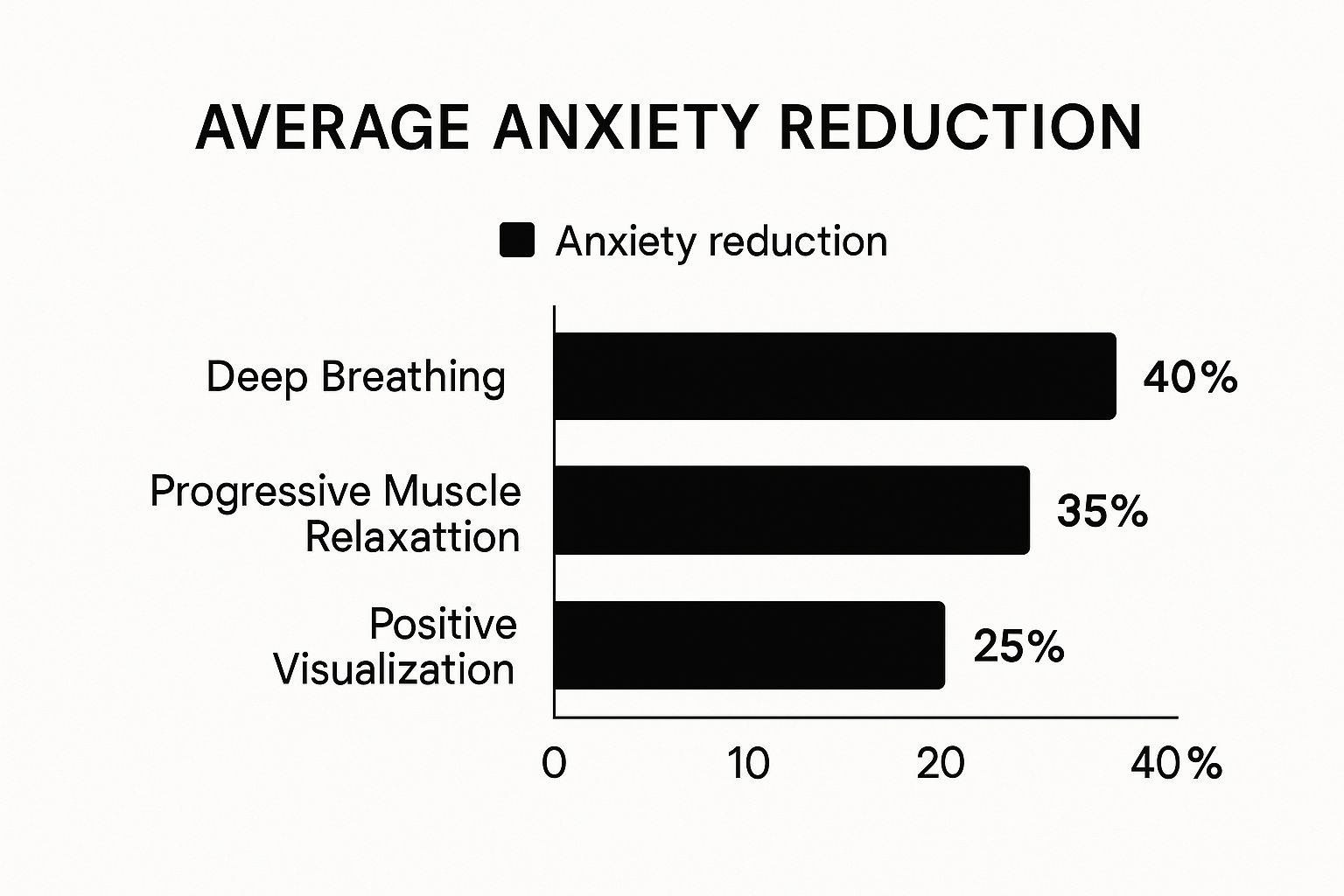
The data really backs this up. As you can see, deep breathing techniques can result in a massive 40% reduction in anxiety symptoms. It's one of the most reliable tools for immediate relief.
Physical vs. Mental Anxiety Symptoms
Anxiety shows up in different ways for everyone, sometimes physically and sometimes mentally. Knowing how to spot the symptom and having a quick solution ready can make all the difference.
| Symptom Category | Common Manifestation | In-the-Moment Solution |
|---|---|---|
| Physical | Racing heart, sweaty palms, shallow breathing | Box Breathing: Inhale-4, Hold-4, Exhale-4, Hold-4. Repeat 3-5 times. |
| Physical | Tense shoulders, fidgeting, feeling shaky | Progressive Muscle Relaxation: Clench and release fists or toes. |
| Mental | Racing thoughts, "what if" spirals, negative self-talk | 5-4-3-2-1 Grounding: Name 5 things you see, 4 you feel, etc. |
| Mental | Mind going blank, inability to focus on the question | Strategic Pause: Say, "Let me think on that," and take a deep breath. |
Recognizing these signs as just your body's stress response—and not a reflection of your ability—is the first step to managing them effectively.
Ground Yourself When Overwhelmed
What if your mind starts racing during the interview? That's when a grounding technique can be a lifesaver, pulling you back before you get lost in a panic spiral. The entire point is to reconnect with your physical surroundings to interrupt that flood of anxious thoughts.
One of the best is the 5-4-3-2-1 technique. Wherever you are, you can do this silently in your head.
Just identify:
- Five things you can see around you.
- Four things you can physically feel (your chair, the desk, your clothing).
- Three things you can hear.
- Two things you can smell.
- One thing you can taste.
This simple sensory exercise forces your brain to pivot from internal chaos to the external, tangible world. It’s a quick and discreet way to reset your nervous system if you start to feel flustered.
Knowing your format helps, too. For example, brushing up on some essential virtual interview tips can remove a lot of the unknowns that cause anxiety.
And remember, if you do have a "mind-blank" moment, don't panic. It happens to everyone. Just take a breath and say, "That's a great question, let me take a moment to think about that." Using that pause to recenter yourself is a huge sign of confidence. How you recover is often more impressive than pretending you never stumbled in the first place.
Staying Cool When the Conversation Heats Up
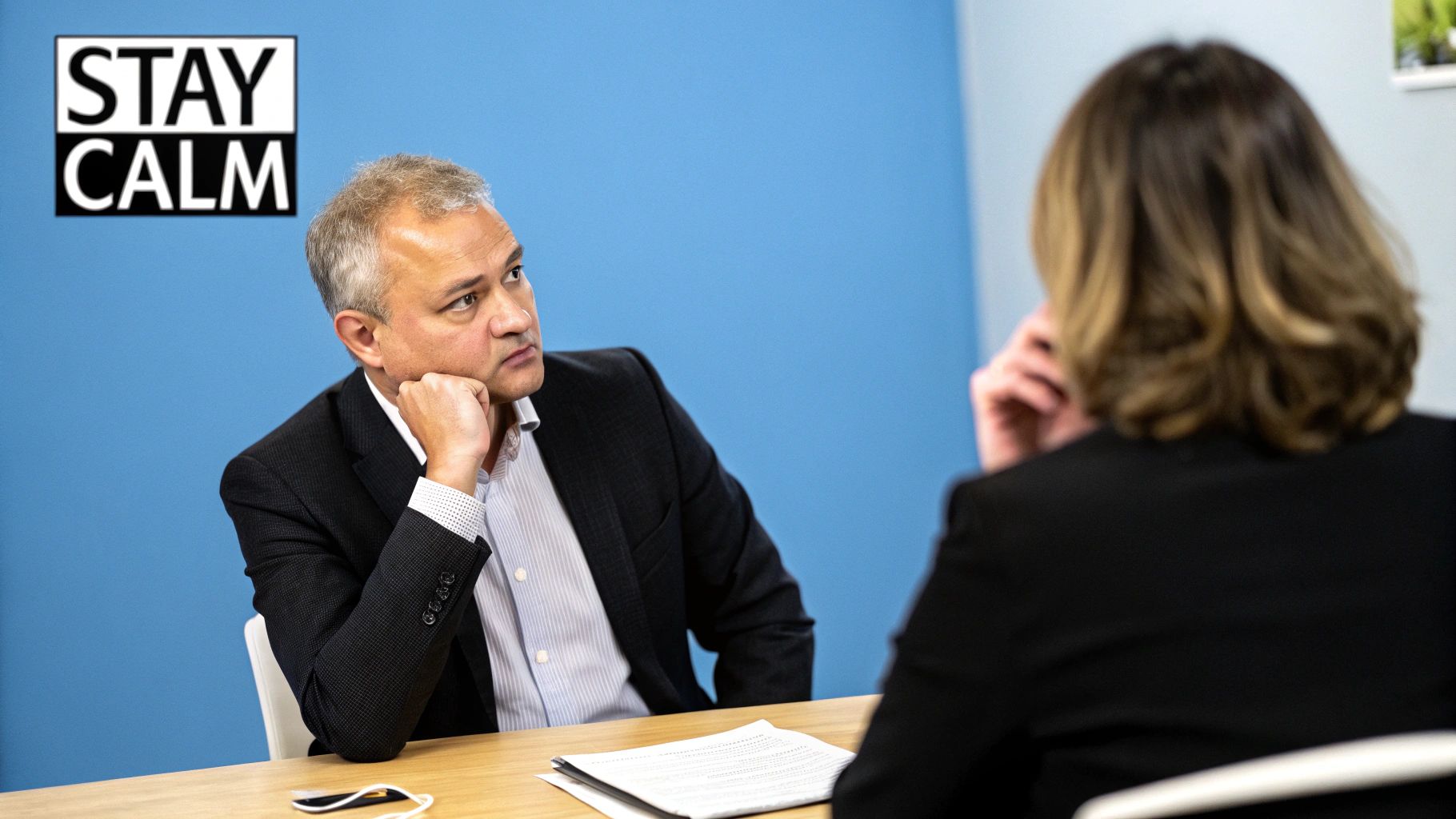
Alright, you’ve made it past the waiting room. Now the real challenge begins: keeping your composure while the interview is actually happening. At this point, it's less about fighting off the jitters and more about staying centered while you talk. The goal isn't to give flawless, robotic answers—it's to build a real connection.
One of the best ways to do this is through active listening. It's so easy to get caught up in your own head, frantically trying to formulate your next answer while the interviewer is still talking. Don't do it. Instead, focus completely on their question. This simple shift does two crucial things: first, you'll actually hear what they're asking, and second, it stops you from launching into a pre-rehearsed spiel that doesn't quite hit the mark.
Don't Be Afraid of the Pause
In a high-stakes conversation, silence can feel incredibly loud. Most people rush to fill any gap, which usually leads to them tripping over their words or giving a half-baked answer. I've seen it countless times. You need to start thinking of the pause as your secret weapon, not a sign of weakness.
When you get hit with a tough question, take a breath. It's perfectly fine to say something like, "That’s a great question. Let me take a moment to think about that." It shows you’re thoughtful, not flustered.
That short pause gives you a chance to:
- Organize your thoughts into a clear, logical answer.
- Take a quick, calming breath to reset your nerves.
- Look more confident and in control.
Trust me on this: a few seconds of thoughtful silence is infinitely better than 30 seconds of panicked rambling. It tells the interviewer you respect their question enough to give it a proper answer.
It's helpful to remember that interview anxiety isn't just one thing. It can be a mix of worrying about how you sound, a fear of failure, or even just the stress of the social interaction. Physical symptoms like a racing heart only add to it. If you want to dive deeper, some great research on the dimensions of interview anxiety breaks down exactly what's going on in our brains and bodies.
Let Your Body Language Do the Talking
Your body says a lot before you even open your mouth. Even if you feel like a bundle of nerves inside, you can project an image of cool confidence with a few simple tweaks to your body language. This isn't about being phony; it’s about using your physical presence to positively influence both the interviewer's perception of you and your own state of mind.
Here are a few things to focus on:
- Posture: Sit up straight, but don't be stiff as a board. Leaning in just a little when they speak shows you're locked in. Slouching, on the other hand, can make you look bored or insecure.
- Eye Contact: Keep it natural and steady. You don't need to win a staring contest, but meeting their gaze for a few seconds at a time builds trust and shows you're present.
- Hands: Feel free to use your hands to emphasize a point. Just try to avoid nervous habits like tapping your fingers or clicking a pen. If you're not sure what to do with them, resting them calmly on the table or in your lap works perfectly.
When you consciously manage these nonverbal cues, you start a positive feedback loop. Acting confident actually helps you feel more confident. It makes it easier to build genuine rapport and handle any curveball questions that come your way without letting panic take over.
Your Questions About Interview Anxiety Answered
https://www.youtube.com/embed/0siE31sqz0Q
Even when you've done all the prep work, those nagging "what if" questions can still pop up. Let's walk through some of the most common worries I hear from job seekers about interview nerves. Having a plan for these specific scenarios can make all the difference.
How Do I Handle Nerves on a Video Call?
Video interviews bring their own unique flavor of anxiety, don't they? The best defense is a good offense—and that means controlling your environment.
Get your tech sorted out way ahead of time. I mean it. Test your camera, mic, and internet connection the day before. Nothing sends a jolt of panic through you faster than a technical glitch two minutes before you're supposed to be on camera.
Next, set your stage. Position your camera at eye level (stacking books works wonders) and make sure the light source is in front of you, not behind. Most importantly, silence the digital noise. Close every single tab you don't need and put your phone on silent, out of sight. Fewer distractions mean you can be fully present with the interviewer, which naturally dials down the anxiety.
My Advice: I always tell people to put a small sticky note right next to their webcam with a one-word reminder like "Breathe" or "Smile." It’s a simple, tiny cue that can ground you and help you project a warmth that's sometimes hard to convey through a screen.
What Should I Do the Morning of the Interview?
The morning of your interview is all about staying calm and centered, not cramming. Think of it as a wind-up, not a sprint.
First, go easy on the caffeine. Chugging coffee is a surefire way to amplify those jitters. Stick with water or maybe some herbal tea. A light, healthy breakfast is also smart; it keeps your blood sugar stable and helps you avoid that dreaded energy crash right when you need to be sharp.
Spend a little time doing something that genuinely relaxes you. Maybe it's a quick walk outside, listening to a favorite playlist, or running through those breathing exercises we talked about. You can do a quick mental review of your main talking points, but don't start second-guessing yourself. Trust the work you've already put in.
If you find that this anxiety isn't just about interviews, but a bigger pattern in your life, seeking professional support can be a game-changer. It’s worth looking into the 5 ways therapy can help you manage anxiety and develop skills for the long haul.
What If I Draw a Complete Blank?
This is the big one—the fear that your mind will just go completely empty when asked a tough question. It happens to the best of us, and it’s not the end of the world. The absolute worst thing you can do is panic.
Instead, take a breath. Give yourself a moment to reset by using a calm, professional filler phrase.
Here are a couple you can keep in your back pocket:
- "That's an excellent question. Let me take a moment to think that through."
- "Could you please repeat the question?"
This simple trick buys you a few precious seconds. Just taking that intense pressure off yourself is often enough to let the answer surface. If you want more tips on building this kind of resilience, check out the other guides on the ParakeetAI blog; we have a ton of resources for job seekers.
Honestly, how you recover from a stumble can be far more impressive to an interviewer than a flawless, robotic performance.




